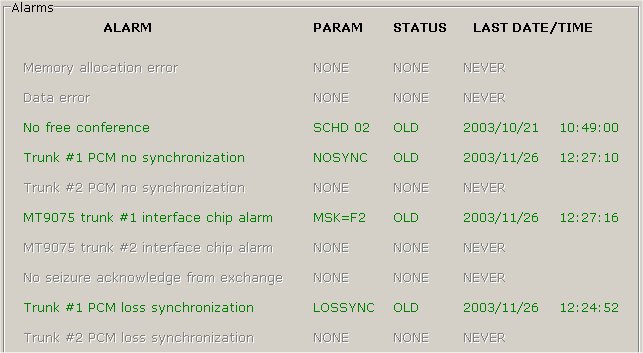 kClient HTML Help: ALARMS
kClient HTML Help: ALARMS kClient HTML Help: ALARMS
kClient HTML Help: ALARMS
General notes
The alarm buffer exists in the nonvolatile memory in the KKO card. All informations about the alarms are saved in the buffer. The following informations is stored here: descriptions, parameters, states and date/time stamps for each alarm. The kClient software user gets information about alarms by the warning window and a special sound (if the PC includes a sound card). Additionally, in the kClient's main window, Alarm button blinks in red colour if any alarm exists. Red led on front panel of KKO card is blinking fast if any alarm exists too.
The following window shows the list of alarm as example:

The alarm's status can be as follows:
The NEW alarms - they are unread alarms (they wait in KKO memory). After the read, the alarm changes in OLD and his time and date stays time and date at the alarm create moment (by internal KKO timer). If alarm's reason disappears, the alarm is 'OLD' (green colour). In other case, alarm will create again as 'NEW' (red colour) with new date and time. The 'OLD' alarms you can clean by "Reset" button only.
KKO card can recognize 13 alarm sources:
Description and parameters of alarms
Memory allocation error
This alarm is active if there isn't enough memory for cheap on KKO. If this alarm is active, contact with servis please.
Wrong data
This is the information about a run-time internal error. In normal conditions this error can't active. If active, you must reset KKO card by pressing RESET button on KKO front panel.
No free conference
This alarm actives if you try to run a third conference at the same time on one KKO. The reason of this alarm can be scheduler. If schedule record will execute when both conference are busy, this alarm will be active. For protect, one free conference should be always free (for scheduler).
Route 1/2 no synchronization
Alarm is active if going to synchronization state on each declared route is impossible. This alarm rewrites continously (after each synchronization test) with NEW status, so you must remove the reason by eliminating this alarm. The typical reasons are: no connection cable, failed cable, TLU76 configuration error or hardware error.
Interface MT9075 error
This is extended information about PCM30 route interface errors. Bits of MT9075 status register are shown in the PARAM column as a hexadecimal word. Individual bits means:
E.g. value MSK=A0 (1010 0000 HEX) means that RAI and AIS16 alarms are activated.
NOTE: After KKO restart the procedure and plug on or plug off route cable some alarms can be active. You must read them. If alarm reasons are temporary, each alarm will be "OLD".
No seizure acknowledgement sequence
This alarm will be active if external exchange doesn't seize a request. The failure will be in : route settings on KKO (Settings/Call simultaneous or Disconnect simultaneous) or route settings in an external PCM device (e.q. TLU76 card).
Loss of route synchronization
This alarm will be active if KKO has got an synchronization and it loses it. The typical reasons are: failure of cable, wrong settings in TLU76.
Vox detector error
Internal error in vox device or internal communication error between vox processor and main processor. If this alarm is active, you must reset the KKO card.
Real time clock error
KKO card is equipped with a battery held real time clock device. This chip has guaranteed hold time minimum 7 years (without power source). Probably the reason for this alarm is very hard interference. If this alarm is active, you must send a new date and time to the KKO.
Flash memory error
This alarm informs you about failure internal communication with announcement's device. Probably the reason for this alarm is very hard interference at recording or erasing moment. In this case, you must reset KKO card and read announcements again. If there are any errors, you must reset announcement module. If the announcement reset command is rejected, try to do it as a supervisor.
Critical memory error
It is probably caused by an invalid operation in the internal memory. If this alarm is active, you must reset the KKO card. If this alarm is active again, you contact service, please.
No free PCM channel
This alarm informs us about an excessive number of subscribers (above 30 or 60 depends on KKO version) or wrong PCM settings in the external exchange.
Two KKO cards cooperation
This alarm appears, when JMP2 jumper is closed and voice link between 2 KKO cards isn't established in given time. If the KKO card is in MASTER mode, value of the parameter in this alarm will show prefix directory number which the KKO is trying to call (e.g. DIR=91). In case of SLAVE mode, constant "SLAVE" text appears in parameter field.
No free schedule record
This alarm appears, when folder scanning feature is used (CMD files are searching). After command file detecting moment, proper command is sent into KKO card. If there is none free record for mainternancing such file (there are only 40 total records) this alarm is generated. If the alarm appears, you have to remove useless old records or switch on the option "Executed records autoerasing" in "Command files" bookmark in option "Schedule".
There are two buttons in the Alarms window for "reading" and "erasing". If you open the window, the alarms will be read from the KKO automatically.